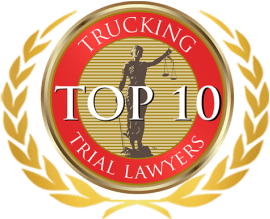California 18-Wheeler Accident Attorney
- PAY NOTHING UPFRONT
- OVER $500 MILLION RECOVERED
- ZERO-FEES UNTIL WE WIN
California 18-Wheel Truck Accident Law Firm with A+ Rating
If you or someone you care about has been injured in a commercial truck accident, you need the professional legal services of an experienced California 18-wheeler accidents attorney. Your claim will be handled by Arash Khorsandi’s team of experienced, committed, and compassionate legal professionals at Arash Law. Obtaining the compensation to which you are entitled is essential to your ability to follow the difficult path toward a complete recovery after a serious injury, and our skilled truck accident attorneys are here to help.
A thriving trucking industry is critical to our nation’s economy. As consumer demand continues to grow, the trucking industry struggles to keep up. The fact is, however, that there are tens of thousands of injury-causing semi accidents in the United States every year, and thousands of these accidents end in traffic fatalities.
While the trucking industry is essential to our bustling American economy, it is also responsible for managing safe fleets that are well-maintained and that are driven by well-qualified truckers who adhere to all relevant driving restrictions. When trucking companies – or truck drivers – attempt to cut corners in order to keep up with demand and maximize profits, they endanger everyone with whom they share the roads. Accidents involving big rigs, due to their massive size and weight, are many times more likely to cause serious injuries and/or fatalities.
California Roads and 18-Wheeler Truck Traffic
California is rife with beautiful highways and byways, but the fact remains that we share all of these roadways with semi-trucks that seem to multiply by the day. These 18-wheelers have strict safety limitations that are imposed upon them by their extreme size and that make them the most dangerous vehicles on our roads.
When you take to California’s beautiful roadways, be on the lookout for semis in your midst. These large trucks come equipped with their own unique driving hazards, and driving defensively is always in your best interest.
Commercial 18-Wheel Truck Accidents: The Statistics
Commercial truck accidents are among the deadliest accidents going, and the Federal Motor Carrier Safety Administration (FMCSA) backs this claim up with myriad statistics:
- In 2016, there were approximately 475,000 traffic accidents involving large commercial trucks, and out of these, there were 3,864 crashes that led to fatalities and 104,000 injury-causing crashes.
- The majority of fatal crashes involving large trucks are two-vehicle accidents.
- Large truck accidents that end in fatalities tend to happen in rural areas and on interstates.
- About 37 percent of all 2016 truck-accident fatalities and 23 percent of all injury-causing truck accidents occurred at night (between the hours of 6 PM and 6 AM).
- The vast majority of all truck-accident fatalities in 2016 happened on Mondays through Fridays.
Additionally, the National Highway Traffic Safety Administration (NHTSA) forwards truck-accident statistics of its own:
- Of the 4,317 fatalities caused by large-truck accidents in 2016, 72 percent were occupants of the other vehicles involved, 17 percent were occupants of the commercial truck involved, and 11 percent were nonoccupants of any vehicle, including pedestrians and bicyclists
- Of all the motorists with prior driving records involved in fatal crashes, commercial truck drivers are a close second only to motorcyclists.
These statistics highlight exactly how dangerous and prevalent accidents involving tractor-trailer are.
Truck Driver Error
Every traffic accident is made unique by its own unique circumstances, and truck accidents are no different on this count. There are, however, several driver-related causes that are commonly associated with semi accidents:
Fatigued Truckers
As noted, extreme demands on the trucking industry lead to extreme demands on truck drivers. Truckers, nevertheless, are professional drivers who are held to much more restrictive regulations than are non-commercial drivers. When a truck driver doesn’t adhere to the regulations pertaining to hours behind the wheel and total hours worked, he or she is far more likely to be driving under the influence of fatigue, which is exceedingly risky. The fact is that fatigued truckers are dangerous truckers.
Unsafe Truckers
Truck drivers must follow the safety rules of the road, and this includes closely adhering to speed limits. When a truck driver speeds, he or she makes a truck accident that much more likely and that much more dangerous. Further, because of their enormous weight and size, trucks require far greater stopping distances and must take steep turns and curves more carefully than do non-commercial vehicles. Finally, truck drivers are responsible for altering their driving to correspond with the conditions on the roadway, including the effects of inclement weather. Failure to do so can be deadly.
Impaired Truckers
Driving under the influence of alcohol or drugs is exceedingly dangerous, and when the driver in question is behind the wheel of an 18-wheeler, it is that much more dangerous. Again, truck drivers are held to much more rigorous standards when it comes to driving under the influence. As such, most states have adopted the federal guidelines forwarding a blood alcohol content (BAC) limit of .04 (half the limit set for non-commercial drivers) with a minimum time limit of 4 hours between drinking and getting behind the wheel of one’s rig.
Distracted Truckers
Since the advent of the smartphone, distracted driving has continued to become more and more of a problem. Distracted driving is dangerous driving, and when the distracted driver is behind the wheel of a massive semi-truck, the danger increases exponentially. A trucker’s job is to safely maneuver his or her rig, and the work includes a good deal of reportage regarding miles driven, breaks taken, and equipment checks performed.
Because the trucking industry is under so much pressure to perform, truckers can sometimes be tempted to get their reporting done while they’re driving, which represents another classification of distraction entirely. Truck drivers are professional drivers who are responsible for doing so safely, and cutting safety corners to increase earnings is an exceedingly dangerous distraction that imperils everyone on the road.
Fault and the Trucking Company
While truckers are responsible for operating their rigs safely, the trucking companies share a massive portion of responsibility when it comes to safe trucking:
- Trucking companies are responsible for maintaining a safe fleet of rigs that receive mandated regular safety checks for specific truck parts and checkpoints.
- Trucking companies are taxed with hiring safe truckers with clean trucking records and who have the training necessary to safely man an enormous 18-wheel truck. When trucking companies put profits before safety and are willing to put inexperienced truckers on the road before they’re ready, they make our highways more dangerous for everyone.
- Trucking companies are responsible for not overscheduling their drivers. Drivers who are expected to perform beyond the boundaries of what’s possible within the parameters of federal and state regulations find themselves in difficult positions. After all, their livelihoods and their families’ welfare depend upon their continued income and being put in a precarious position can leave them with little choice other than to push the boundaries of safety.
- Trucking companies are ultimately also responsible for ensuring that their loading crews are well trained and capable of safely loading trailers with cargo. When a semi-truck is loaded improperly, the imbalance of weight can exacerbate the severity of an accident and can even cause an accident.
- The trucking company is also tasked with employing truck mechanics who are not only well trained but who also remain current in their field. Part of this responsibility includes providing mechanics with the quality parts and tools necessary to keep the fleet in safe working condition. Scrimping on maintenance and repairs can be a deadly way to attempt to increase one’s bottom line.
The trucking industry is a highly lucrative business that is carefully regulated for a very important reason – to help minimize the dangers inherent in having huge and powerful vehicles roaming our roadways. It is the trucking industry’s obligation to carefully adhere to all rules and regulations, and when it fails to do so, it can be held responsible for any ensuing accidents.
$1,000,000.00
Settlement in a case where a client was injured while unloading commercial truck; client sustained crush injuries to legs.– Judd Ross Allen
Safely Sharing California’s Highways with Semi-Trucks and 18-Wheelers
If you drive in California, sharing our beautiful highways with massive semi-trucks is part of the bargain. While recognizing the safety hazards posed by tractor-trailers with which you share the road is an important component of safe driving, the FMCSA forwards a variety of safety tips that are specific to staying safe out there:
Mind 18-Wheel Semi-Trucks and Their Blind Spots
The fact is that every driver experiences some blind spots when he or she is behind the wheel, but commercial truck drivers experience huge swaths of blind spots all the way around their rigs. Being aware of these blind spots and staying out of them whenever possible can go a long way toward helping you safely share the roadway with semis.
The best way to adapt this advice into a practical mechanism that you can apply to your driving is to keep in mind that if you can’t see the truck driver in the truck’s side mirror, the driver probably can’t see you. Further, don’t pull in front of a tractor-trailer unless you can see its entire cab in your rearview mirror. Finally, allow big trucks in your midst as much room as you possibly can at all times.
Pass with Care
If it’s necessary to pass a semi on the road, proceed with caution. Don’t pass until you have a clear pathway for doing so, and never pass on the truck’s right. Once you’ve begun the passing maneuver, do not linger but instead move forward with dispatch until you have safely made your way past the semi. Remember that trucks tend to pick up speed on downgrades, so don’t attempt to overtake an 18-wheeler when you’re on the downside of a sloping highway.
Finally, when a truck is passing you, slow down a bit and give it the space it needs to maneuver safely. Remember when it comes to big rigs and passing, the less time you spend near the truck, the better – this also applies when trucks are merging into traffic from an onramp or are changing lanes.
Don’t Cut Things Close
Cutting off any other vehicle when you are driving is a dangerous proposition, but cutting off a massive commercial truck is potentially deadly. If you move in front of a truck before you can see the cab in its entirety, the truck driver is likely not to see you in time to react safely. Even if the driver does spot you pulling in, however, he or she likely won’t have the space necessary to react safely if such a reaction is necessary.
The fact is that with their immense size and weight, 18-wheelers take far longer and require far greater distances to slow down and/or to come to a safe stop. To put it more succinctly, a fully loaded large commercial truck that is traveling at highway speeds on good roads needs the full length of two football fields to come to a complete stop. When the roadway is in bad condition or is adversely affected by inclement weather, this distance increases.
Don’t Tailgate
When you drive closely behind a semi, you are in a blind spot and the trucker doesn’t have any idea that you are there. Because tractor-trailers ride high off the road, there is also the potential to slide underneath – or to be pushed underneath – in the event of an accident. While trucks must be equipped with Mansfield guards that help prevent underride accidents, they don’t prevent such accidents completely and crashing into one of these safety bars is still exceedingly dangerous. Mansfield bars are so named for Hollywood starlet Jane Mansfield’s fatal underride accident decades ago that sparked a movement to mandate these rear-end safety bars.
Anticipate and Allow for Wide Turns
Physics dictate that large trucks need extra room on the roadway to make turns. If you see a semi preparing to turn, give it a wide berth and remember that trucks will sometimes turn from a middle lane. Watch for these trucks’ turn signals, and never rush to squeeze past a turning semi or get between a turning semi and the curb. Finally, when it comes to stopping at intersections, make sure you remain behind the white line so you don’t block the box, which means not allowing large trucks ample room to make turns safely.
Be a Safe, Courteous, and Patient Driver
Commercial trucks are a fact of driving, and attempting to rush them or to aggressively weave in and out among them is not only discourteous but is also exceedingly dangerous. Trucks take longer to get up to speed, and impatiently passing in the process is unlikely to get you where you’re going any faster. Additionally, some trucks are affected by technology like speed limiters. Sharing the road courteously with 18-wheelers helps to keep our California highways safer for everyone.
The great State of California has some of the most beautiful and expansive highways in our nation, but they also see some of our country’s deadliest truck accidents. If you or your loved one has been injured in a truck accident, it’s time to consult with a skilled California 18-wheeler accident attorney. Our dedicated legal team has the experience, knowledge, and commitment to aggressively advocate for the compensation to which you are entitled and that you need to better travel the road to recovery.





18-Wheel Truck Drivers and Trucking Regulations
Truck drivers are professional drivers who – for safety’s sake – are required to closely adhere to multiple restrictive regulations. The FMCSA implements and enforces regulations on all commercial vehicles that are interstate bound in the United States:
Every commercial truck driver must be appropriately licensed with a commercial driver’s license (CDL) and the appropriate and necessary training for operating the commercial truck in question.
A medical professional must sign off on a truck driver being healthy enough – and absent of any potentially compromising medical conditions – to man his or her rig safely.
There are strict hours-of-service requirements in place to help prevent truckers from driving while fatigued. Such regulations implement restrictions regarding consecutive hours spent behind the wheel and the number of consecutive days a trucker can log without taking a specified number of hours off the clock.
Further, truckers are tasked with keeping careful track of their hours spent driving, of their mandatory breaks, of their truck inspections, and more. It’s the nature of the business, however, that truck drivers can be less than scrupulous when it comes to keeping their logs, and some are not above cheating the numbers. Hours of service regulations are put in place specifically to protect motorists, and when truck drivers fail to abide by these important safety regulations, they flout their professional responsibilities and endanger others in the process.
Federal laws also mandate regularly scheduled truck inspections. These include pre-shift inspections by the truck driver and regularly scheduled fleet inspections by the trucking company. While the truck drivers’ skill, experience, and professionalism are all critical to minimizing truck accidents on our roadways, it’s important to recognize that maintaining safe semis with well-functioning brakes and tires that are all in good condition is the first line of defense when it comes to safety.
While we all recognize that big rigs are just that – BIG – it can be difficult to comprehend exactly how large they are. In fact, the maximum weight allowable (dependent upon size, number of axels, and other variables) is 80,000 pounds. Though the weight of the average American car continues to creep upward, it still comes in at a paltry – by comparison – 4,000 pounds. In other words, 18-wheelers can be a full 20 times heavier than most non-commercial vehicles on the road. This is a massive size differential that leaves the average driver at a distinct safety disadvantage.
As such, commercial trucks are held to strict size and weight restrictions and are penalized quite harshly when they are overweight. Trucks that carry too much weight are not only hard on our highways but are also much more dangerous in an accident situation. Additionally, the extra weight can even play a causative role in such an accident.
Filing Your 18-Wheeler Truck Accident Claim
If you or someone you love has been injured in a truck accident, your first priority must always be immediately obtaining the medical attention that you need. Because truck accidents are among the most violent traffic accidents out there, the emotional impact alone can be extremely daunting. Fortunately, you don’t have to face the path ahead of you alone. While you attend to the important work of recovering your health, your dedicated California truck accident attorney will gather the necessary evidence, communicate with the insurance company on your behalf, and fight for the compensation that will adequately cover the damages you’ve sustained – in their entirety.
Going through the trauma associated with a violent truck accident is exceedingly stressful and anxiety provoking, but this is no time to leave your claim to chance – or to the insurance company involved. Your full recovery likely hinges on you being adequately compensated for the injuries you’ve incurred as a result of someone else’s negligence. Consult with an experienced California 18-wheel truck accident attorney as soon as you are able to do so.
If a Truck Accident Has Left You Injured, You Need the Professional Legal Counsel of an Experienced California 18-Wheeler Accidents Attorney
A truck accident is likely to leave you unsure about how best to move forward, and you may be tempted to simply accept whatever settlement the insurance company offers in an effort to put the thing behind you as quickly as possible. This, however, is not in the best interest of your claim or of your health. You are not alone. The dedicated legal team at Arash Law headed by Arash Khorsandi, Esq. has the commitment, knowledge, and compassion to help ensure that you recover on your damages so that you can move forward on the path toward full recovery. Our experienced 18-wheeler accident attorneys are standing by to help – 24 hours a day and 7 days a week – so please give us a call us at (888) 488-1391 today.































